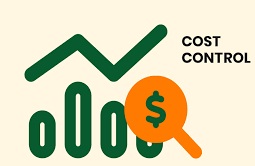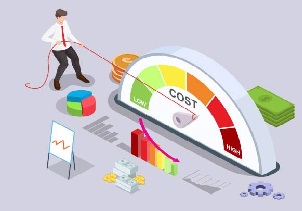![]()

Cost control
What is the Meaning of Cost Control?
In any organization, managing expenses effectively is crucial for maintaining profitability and ensuring financial stability. This is where cost control comes into play. But what exactly is cost control, and why is it so important?
Understandingﺡ
Cost control refers to the process of managing and regulating expenses to ensure they stay within the budgeted limits. It involves planning, monitoring, and adjusting expenditures to prevent overspending and optimize the use of resources. The primary goal of cost control is to maximize profitability by keeping costs as low as possible without sacrificing quality or efficiency.
Key Componentsﺡ
1.Budgeting: Establishing a financial plan that outlines expected revenues and expenditures. A well-prepared budget serves as a benchmark for cost control.
2.Cost Planning: Identifying and estimating the costs required for various activities or projects. This step helps in setting realistic budgetary limits.
3.Monitoring: Regularly tracking actual expenses against the budget. This involves comparing financial reports and identifying any deviations from the planned costs.
4.Analysis: Reviewing the reasons for any discrepancies between budgeted and actual costs. This step helps in understanding whether the variances are due to inefficiencies, unforeseen expenses, or errors.
5. Corrective Actions: Implementing measures to address any issues identified during the analysis phase. This might include adjusting processes, renegotiating contracts, or finding cost-saving opportunities.
6.Reporting: Documenting and communicating cost-related information to stakeholders. Effective reporting helps in maintaining transparency and ensuring that everyone is aware of the financial status.
Why is Cost Control Important?
1.Improves Profitability: By managing expenses effectively, organizations can increase their profit margins and achieve better financial outcomes.
2.Enhances Efficiency: Cost control encourages businesses to identify and eliminate wasteful practices, leading to more efficient operations.
3. Supports Financial Stability: Proper cost management helps in maintaining a healthy cash flow and avoiding financial crises.
4.Facilitates Decision-Making: Accurate cost information provides valuable insights for making informed business decisions and strategic planning.
5. Boosts Competitiveness: Organizations that control costs effectively can offer better pricing or invest more in growth opportunities, giving them a competitive edge.
Implementing Effectiveﺡ
- Set Clear Objectives: Define what you want to achieve with cost controls and establish specific, measurable goals.
2.Engage All Departments: Cost controls should be a company-wide effort. Ensure that all departments understand their role in managing expenses.
3.Use Technology: Leverage financial software and tools to track and analyze costs more efficiently.
4.Review Regularly: Conduct frequent reviews of cost performance and make adjustments as needed.
5. Encourage Accountability: Assign responsibility for cost controls to relevant personnel and hold them accountable for staying within budget.
6. Foster a Cost-Conscious Culture: Promote awareness and importance of cost controls throughout the organization.
Conclusion
It is an essential aspect of financial management that helps organizations maintain profitability and efficiency. By understanding and implementing effective cost controls measures, businesses can ensure that their resources are used wisely, ultimately leading to greater financial success and stability.
FAQs
To visit- https://www.mca.gov.in/
Contact:ﺡ ﺡ ﺡ ﺡ 8130555124, 8130045124
Whatsapp:ﺡ ﺡ https://wa.me/918130555124
Mail ID:ﺡ ﺡ ﺡ ﺡ ﺡ ﺡ operations@vibrantfinserv.com
Web Link:ﺡ ﺡ ﺡ https://vibrantfinserv.com
FB Link:ﺡ ﺡ ﺡ ﺡ ﺡ ﺡ https://fb.me/vibrantfinserv
Insta Link:ﺡ ﺡ https://www.instagram.com/vibrantfinserv2/
Twitter:ﺡ ﺡ ﺡ ﺡ ﺡ ﺡ https://twitter.com/VibrantFinserv
Linkedin:ﺡ ﺡ ﺡ https://www.linkedin.com/in/vibrant-finserv-62566a259/

For further details visit:ﺡ https://vibrantfinserv.com/service-detail-25.php